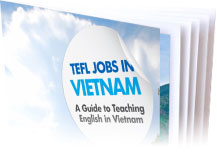Teach English in Vietnam
Why teach English in Vietnam...
Teaching English in Vietnam is what many people have in mind when they take a TEFL course with i-to-i. This is due in part to the high TEFL salary and the low cost of living in this beautiful country.
Many teachers find a job in Vietnam before making the move and there are three clear routes into teaching once you have your TEFL qualification:
Find a year-long salaried contract with a large Vietnamese language school.
Work for yourself and teach private lessons at an hourly rate.
Take a fully supported short-term TEFL training program, like the Vietnam Internship.
There are pros and cons to each of these options! The year-long contract with the language school will pay well but requires a degree of commitment and a high level TEFL certificate, working for yourself will allow a great work life balance but can be insecure and the internship provides a short term, well paid opportunity to teach English in Vietnam but comes with an initial cost.
It’s great for TEFL teachers because…
Yes, there is a huge demand for English teachers in Vietnam. Yes, you can live comfortably here as a TEFL teacher, but this isn’t the only thing that draws people to teach English in Vietnam.
This beguiling country has everything from a stunning coastline, majestic mountains, amazing food and every which way you turn is a photo opportunity; do we have to say more? The majority of positions in Vietnam are teaching children from 5-15 in either a private language school, or state school; and all you’ll need is an accredited TEFL certificate and a degree to secure a job.
One of the main drivers for the demand for English Teachers in Vietnam is the National Foreign Languages Project, which is a government initiative which has the aim of majority of Vietnam’s students being able to use English confidently by 2020. This means that English is definitely an educational priority in Vietnam.
All you need to teach in Vietnam is…
To teach English in Vietnam, you'll need a degree, and a minimum of Professional TEFL certificate (120 Hours); although our 140 Hour Combined TEFL Course is preferred if you have no experience of teaching. You'll need your BA certificate and your TEFL certificate to get your Visa.
Average Monthly Teaching Salary
- 42,000,000 VND
- £1,210
- $1,975
Free Teaching English in Vietnam Guide
Get your free guide to teaching English in Vietnam and find out more.

Information
- Language: Vietnamese
- Currency: Vietnamese Dong (VND)
- Population: 89.7 million
- Capital City: Hanoi
Find out more...
Cost of Living
The average salary for those teaching English in Vietnam is high in comparison to the cost of living and you’ll be able to live very well on a teacher’s salary. It’s hard to quantify but some sources put the average cost of living in Vietnam at around £500/$800 per month when you add everything together.
To give you an example, a meal out can cost as little as $1 if you eat at one of the street food stalls and a meal in a restaurant is around £6/$10. Although you can easily afford a place of your own, a lot of TEFL teachers choose to share with friends or colleagues so they’ve got others to share the great experiences with. HCMC is the most expensive place to live, with Hanoi being a little lower than HCMC. Be aware of taxes; they can be up to 35% for TEFL teachers, but you should still have plenty to live on.
Food and Drink
Traditional Vietnamese food is very healthy, and you’ll feel like you’re cleansing yourself with each meal you have. Rice, noodles and soups are the basis for nearly all Vietnamese delicacies: Pho noodle soup is a very popular dish, comprising of bean sprouts, lime wedges, basil, mint, chilli sauce, fish sauce and either chicken or beef.
The taste somewhat changes depending on which part of Vietnam you’re in: Hanoi makes it as a clear broth, whereas in Southern Vietnam, Pho is slightly sweeter with additional herbs. When in Hanoi, you must try Bun Cha, as it’s practically a staple there: grilled sausage patties are accompanied with a basket of herbs, bean sprouts, pickled vegetables and the Vietnamese’s favourite fish sauce.
Drinks-wise, Vietnam has a pretty hardcore drinking culture, especially when it comes to beer, and it’s predicted that by next year, Vietnam will be the world’s biggest consumer of Heineken. It’s socially acceptable to drink beer at all times of the day in Vietnam, so if you want it for breakfast no one’s going to tell you otherwise! For a Vietnamese-spin, shun the international brands and try the local beers of Saigon Red or Huda.
Weather
Located in South-East Asia, Vietnam has what is described as a ‘tropical climate’. Hanoi has the most unpredictable weather, with hot, humid and rainy summers (so you can leave those straighteners at home!), dipping down to 17 degrees in the winter – not exactly cold, but amongst the lower temperatures in Vietnam. The second largest city of Ho Chi Minh boasts better weather, with less rainfall and constant high temperatures – it rarely falls below 22 degrees Celsius, even in December!
Accommodation
In the cities, you’ll find a very good standard of accommodation, and at extremely cheap prices, you’ll be able to get more for your money than you would at home – some of the modern apartment blocks in the cities even have a gym and pool for you to enjoy. In the country, housing will not be so modern, but still adequate and it will of course, be cheaper. Rents don’t tend to include utilities but you can expect to pay about £25/$40 a month for internet, electricity and water.
Although accommodation isn’t usually included in teaching contracts in Vietnam you shouldn’t worry. It’s easy to find accommodation in Vietnam just as you would in your home country, either by looking on the internet or at the local English speaking newspaper or by checking noticeboards at your school.
Where could I teach English in Vietnam?
Hanoi, Ho Chi Minh City and Haiphong are the three top cities for teaching English in Vietnam due to the large population, resulting in a higher number of both private and public schools. Hanoi can only be described as busy, so if you love a fast-paced life, then it’s definitely a place you’d enjoy living in! Despite being a bit rough around the edges and the permanent traffic, the people are very friendly and there are plenty of beautiful sights such as the Tran Quoc Pagoda and the Tay Ho Temple, sitting by the lakeside.
Ho Chi Minh City is ideal if you prefer a more sophisticated city, with its open-air Parisian café’s and the classy bars. The shopping is definitely a unique experience: alongside your branded clothes (in which case, be sure to visit Vincom Centre – a shopping mall housed in a skyscraper), peruse the markets where you can pick up everything from hand-woven fabrics to old propaganda posters!
If you prefer a more laid-back city to live and teach in, then the third largest city of Haiphong – to the North of Vietnam – is the ideal choice. Also known as the ‘city of flowers’ due to the flame-flower trees lining most streets, Haiphong is home to a major port; and is just 20km away from Do Song beach, boasting white sands, and an abundance of karaoke bars!
Transportation
In the city
The buses in Hanoi are very cheap, at approximately 20p/$0.33 for a one-way ticket, and are fairly frequent. Don’t be put off by the lack of foreigners using them, as the bus is a great way of getting from the suburbs to the centre. However – and this is true of the buses in all of Vietnam’s major cities – unless you know exactly where you need to get off, catching the bus can be confusing, which is why motorcycles are such a popular method of getting around the city.
Taxis can be found in the larger cities of Hanoi and are fairly safe and inexpensive, and you have little chance of being scammed. Expect to bargain the price of a ride, as a lot of drivers will prefer to do this than turn the meter on. If you plan on catching a taxi, be sure to carry plenty of small change, as it’s unlikely you’ll get change for notes.
Further afield
If you opt to teach private lessons like the majority of TEFL teachers, you’ll most likely be working 25-30 hours a week in your normal job, plus extra hours outside of that so it’s likely your weekends will be free to explore all of the amazing things Vietnam has to offer! Fly between Hanoi and Ho Chi Minh City for just £100/$160 with low-cost carrier Vietjet, taking 2 hours; or explore further afield with a flight to Bangkok for a mere £75/$115 return – a great weekend getaway!
Insider Tips
The Vietnamese love children and subsequently have great respect for those who educate them. As an English teacher in Vietnam you can expect to be treated with high praise by the locals. Just make sure that you get properly TEFL certified to live up to their high expectations.
Driving in Vietnam is very chaotic, and has amongst the highest car accident death rates in the world, with approximately 30 deaths per day. 95% of vehicles on the road are motorbikes; so if you ride to work, ALWAYS make sure you wear a helmet, or to be on the safe side, walk or use public transport instead.
Pickpockets are rife in Hanoi – keep your belongings close to you, your bag zipped up, and don’t put anything in your pockets. The pickpockets are very clever, and are constantly coming up with new tricks, so chances are, you won’t be able to beat them.
100% Safe & Secure
Your data will be held securely and used by i-to-i only. We don't sell information to third parties.
